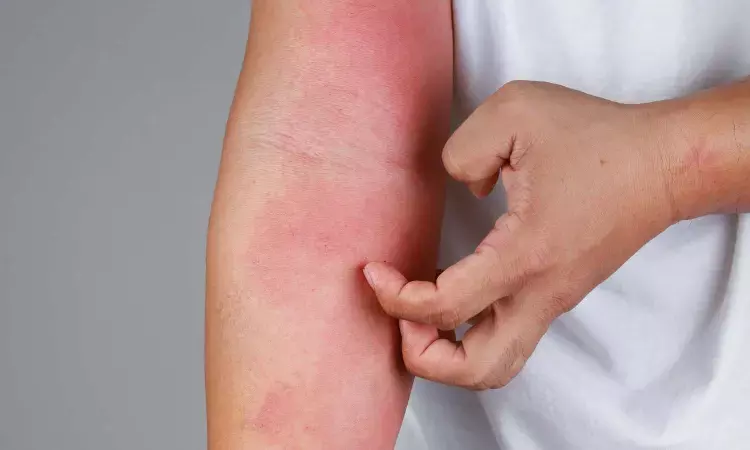- Home
- Medical news & Guidelines
- Anesthesiology
- Cardiology and CTVS
- Critical Care
- Dentistry
- Dermatology
- Diabetes and Endocrinology
- ENT
- Gastroenterology
- Medicine
- Nephrology
- Neurology
- Obstretics-Gynaecology
- Oncology
- Ophthalmology
- Orthopaedics
- Pediatrics-Neonatology
- Psychiatry
- Pulmonology
- Radiology
- Surgery
- Urology
- Laboratory Medicine
- Diet
- Nursing
- Paramedical
- Physiotherapy
- Health news
- Fact Check
- Bone Health Fact Check
- Brain Health Fact Check
- Cancer Related Fact Check
- Child Care Fact Check
- Dental and oral health fact check
- Diabetes and metabolic health fact check
- Diet and Nutrition Fact Check
- Eye and ENT Care Fact Check
- Fitness fact check
- Gut health fact check
- Heart health fact check
- Kidney health fact check
- Medical education fact check
- Men's health fact check
- Respiratory fact check
- Skin and hair care fact check
- Vaccine and Immunization fact check
- Women's health fact check
- AYUSH
- State News
- Andaman and Nicobar Islands
- Andhra Pradesh
- Arunachal Pradesh
- Assam
- Bihar
- Chandigarh
- Chattisgarh
- Dadra and Nagar Haveli
- Daman and Diu
- Delhi
- Goa
- Gujarat
- Haryana
- Himachal Pradesh
- Jammu & Kashmir
- Jharkhand
- Karnataka
- Kerala
- Ladakh
- Lakshadweep
- Madhya Pradesh
- Maharashtra
- Manipur
- Meghalaya
- Mizoram
- Nagaland
- Odisha
- Puducherry
- Punjab
- Rajasthan
- Sikkim
- Tamil Nadu
- Telangana
- Tripura
- Uttar Pradesh
- Uttrakhand
- West Bengal
- Medical Education
- Industry
Weight gain unexpected and unexplained side effect of dupilumab in treatment of atopic dermatitis

Weight gain in patients associated with severe atopic dermatitis treated with dupilumab suggests a new study published in the BMC Dermatology
Dupilumab, targeting the interleukin-4α receptor and inhibiting the action of interleukin-4 and interleukin-13, was recently approved for treatment of moderate to severe atopic dermatitis. There is limited data on long-term effects and safety among patients with severe atopic dermatitis treated with dupilumab. Weight gain was observed among patients treated with dupilumab in our clinic. The aim was to describe weight change in a cohort study of patients with severe atopic dermatitis treated with dupilumab from baseline to follow-up after 12 months, and to analyze if weight change was associated with effect of treatment, reported appetite, and/or disturbed night sleep due to itching.
All patients with atopic dermatitis receiving systemic treatment at the Unit of Dermatology, Karolinska University Hospital, have been registered and monitored consecutively since January 2017. This cohort constituted all patients who started treatment on dupilumab or methotrexate between 10 January 2017 and 30 June 2019 with at least 6 months of follow-up within the study period. The following variables were monitored at start of and during treatment: Eczema Severity Score Index, Patient-Oriented Eczema Measure, visual analogue scale for pruritus 10 cm, Montgomery-Åsberg Depression Rating Scale, Dermatology Life Quality Index, and weight. Data analyses were performed using two-sample Wilcoxon-Mann-Whitney rank-sum test, or the Wilcoxon matched-pairs sign-rank test with a p-value < 0.05 considered as statistically significant.
Results
• Patients treated with dupilumab (n = 12) gained weight after 1 year on treatment.
• The majority of patients showed a good response to treatment with dupilumab; at follow-up at 6, 9, or 12 months, they reached EASI-90 (n = 6), EASI-75 (n = 4), or EASI-50 (n = 1). There was no significant association between weight gain and treatment response, reported appetite, or disturbed night-sleep due to itch.
• Patients treated with methotrexate showed no significant weight change (n = 8).
To the knowledge, this is the first report on a possible association between weight gain and dupilumab treatment; the extent of the association is yet to be seen, as is the mechanism behind this finding.
Reference:
Johansson, E.K., Ivert, L.U., Bradley, B. et al. Weight gain in patients with severe atopic dermatitis treated with dupilumab: a cohort study. BMC Dermatol 20, 8 (2020). https://doi.org/10.1186/s12895-020-00103-0
Dr. Shravani Dali has completed her BDS from Pravara institute of medical sciences, loni. Following which she extensively worked in the healthcare sector for 2+ years. She has been actively involved in writing blogs in field of health and wellness. Currently she is pursuing her Masters of public health-health administration from Tata institute of social sciences. She can be contacted at editorial@medicaldialogues.in.
Dr Kamal Kant Kohli-MBBS, DTCD- a chest specialist with more than 30 years of practice and a flair for writing clinical articles, Dr Kamal Kant Kohli joined Medical Dialogues as a Chief Editor of Medical News. Besides writing articles, as an editor, he proofreads and verifies all the medical content published on Medical Dialogues including those coming from journals, studies,medical conferences,guidelines etc. Email: drkohli@medicaldialogues.in. Contact no. 011-43720751


